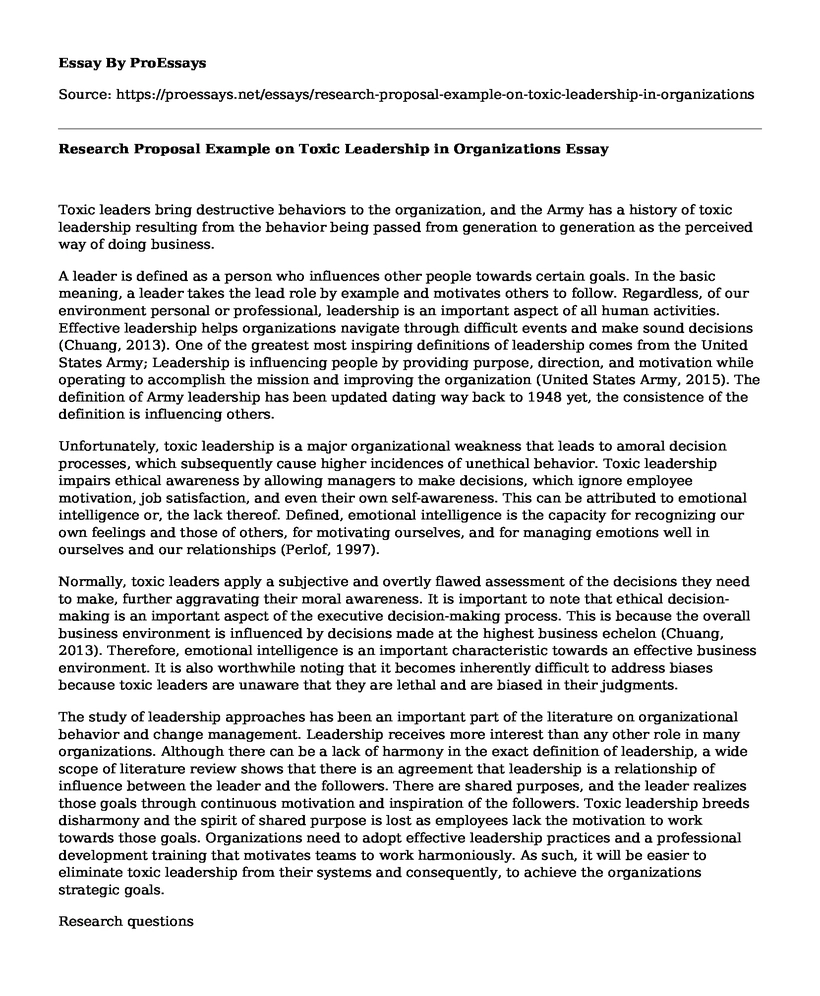Toxic leaders bring destructive behaviors to the organization, and the Army has a history of toxic leadership resulting from the behavior being passed from generation to generation as the perceived way of doing business.
A leader is defined as a person who influences other people towards certain goals. In the basic meaning, a leader takes the lead role by example and motivates others to follow. Regardless, of our environment personal or professional, leadership is an important aspect of all human activities. Effective leadership helps organizations navigate through difficult events and make sound decisions (Chuang, 2013). One of the greatest most inspiring definitions of leadership comes from the United States Army; Leadership is influencing people by providing purpose, direction, and motivation while operating to accomplish the mission and improving the organization (United States Army, 2015). The definition of Army leadership has been updated dating way back to 1948 yet, the consistence of the definition is influencing others.
Unfortunately, toxic leadership is a major organizational weakness that leads to amoral decision processes, which subsequently cause higher incidences of unethical behavior. Toxic leadership impairs ethical awareness by allowing managers to make decisions, which ignore employee motivation, job satisfaction, and even their own self-awareness. This can be attributed to emotional intelligence or, the lack thereof. Defined, emotional intelligence is the capacity for recognizing our own feelings and those of others, for motivating ourselves, and for managing emotions well in ourselves and our relationships (Perlof, 1997).
Normally, toxic leaders apply a subjective and overtly flawed assessment of the decisions they need to make, further aggravating their moral awareness. It is important to note that ethical decision-making is an important aspect of the executive decision-making process. This is because the overall business environment is influenced by decisions made at the highest business echelon (Chuang, 2013). Therefore, emotional intelligence is an important characteristic towards an effective business environment. It is also worthwhile noting that it becomes inherently difficult to address biases because toxic leaders are unaware that they are lethal and are biased in their judgments.
The study of leadership approaches has been an important part of the literature on organizational behavior and change management. Leadership receives more interest than any other role in many organizations. Although there can be a lack of harmony in the exact definition of leadership, a wide scope of literature review shows that there is an agreement that leadership is a relationship of influence between the leader and the followers. There are shared purposes, and the leader realizes those goals through continuous motivation and inspiration of the followers. Toxic leadership breeds disharmony and the spirit of shared purpose is lost as employees lack the motivation to work towards those goals. Organizations need to adopt effective leadership practices and a professional development training that motivates teams to work harmoniously. As such, it will be easier to eliminate toxic leadership from their systems and consequently, to achieve the organizations strategic goals.
Research questions
Does an employee's perception of inequality inside the organization result in innumerable positive and negative outcomes?
Does toxic leadership have any influence on the performance and job satisfaction of employees?
Do creativity and innovation influence the administration process within organizations?
What role can employees play regarding addressing the harmful leadership practices within their organization?
How does an employee's personality affect job satisfaction?
What steps can an organization take to suppress the rise of toxic leadership?
What negative effects do toxic leadership, procedural injustice, and unsafe working conditions have on the morale of junior employees?
Is there a significant difference in perception of injustice between civilian and military organizations?
Research Hypothesis
H1: Junior members of an organization will go through perceived unsafe working environment, procedural injustices and decreased morale under a toxic leadership environment.
H2: As toxic leadership appreciates in the workplace, there will be a subsequent decrease in work performance by subordinates.
Overall Objective
To define toxic leadership in a highly controlled, structured environment and how an injurious leadership style is noxious to the organization.
To identify specific leadership styles and practices for a given organization.
Mirror the current use of the command climate survey data collection process to access the morale of civilian and military members on their perspective organizations.
Specific Aim
Identify characteristics of toxic leadership within an organization.
Identify the role of toxic employees on the organization culture.
To identify the effects that toxic leadership has on the organization.
To identify specific leadership styles and practices for a given organization.
The intent of the research is to show the effects of coupled leadership styles, driven by emotional intelligence, and the impact on the human resource of an organization. When there is bullying in the organization whether direct or indirectly the mission suffers resulting in the support echelon of military becoming combat ineffective rather than combat multipliers.
References
Chuang, S. F. (2013). Essential Skills For Leadership Effectiveness In Diverse. Online Journal of Workforce Education and Development, 1-23.
The United States. (2015). FM 6-22 Leader development. Washington, D.C: Department of the Army
Perloff, R. (1997). Daniel Golemans Emotional intelligence: Why it can matter more than IQ. The Psychologist-Manager Journal, 1(1), 21-22. doi:10.1037/h0095822
Cite this page
Research Proposal Example on Toxic Leadership in Organizations. (2021, Apr 05). Retrieved from https://proessays.net/essays/research-proposal-example-on-toxic-leadership-in-organizations
If you are the original author of this essay and no longer wish to have it published on the ProEssays website, please click below to request its removal:
- Essay Sample on Unhealthy Relationship at the Workplace
- Response to Post on Organizational Culture
- Narcissist and Covenant Leadership - Essay Sample
- Essay Example on Real Estate Sec. Market: 20 Yrs of Growth & Risk Impact
- Leadership Across Cultures: Examining Iconic Leaders in South Africa and India - Essay Sample
- Essay Example on COBIT Model: Crucial for Integrated IT Governance
- Essay on Organizational Behavior: Micro, Meso & Macro-Levels Impacting Human Conduct







